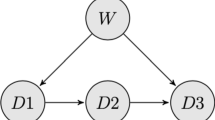Abstract
We present a causal theory based on an interventionist conception of causality, i.e., a preference to select causes among a set of actions which an agent has the ability to perform or not (free will). Emphasis is put on the temporal and explanatory aspects of causal reasoning. We introduce a formal framework enabling to define the notion of voluntary cause in a way allowing for an effective retrieval of causes in a given situation. The causal knowledge is represented by causal rules of two kinds: strict and “normal”. The latter is based on the notions of preferred time lines (futures that the agent normally has in mind when (s)he opts for performing the action) and of inhibiting events (the occurrence of which prevents the anticipated effect to happen). A situation is described by a set of events occurring on time lines; this description is completed by default assumptions (when an agent performs an action, we assume, unless this is inconsistent, that its preconditions are fulfilled and that no inhibiting event will take place). An example is presented, extension to first‐order is briefly discussed, and our approach is compared to related works.
Similar content being viewed by others
References
J. Allen, Towards a general theory of action and time, Artificial Intelligence 23 (1984) 123–;154.
A.B. Baker, A simple solution to the Yale Shooting Problem, in: Proc. KR(1989) pp. 11–;20.
J.P. Delgrande, A first-order conditional logic for prototypical properties, Artificial Intelligence 33 (1987) 105–;130.
J.P. Delgrande, An approach to default reasoning based on first-order conditional logic, Artificial Intelligence 36 (1988) 63–;90.
F. Gayral and P. Grandemange, Evénements: ponctualité et durativité, in: Actes Congrès RFIA (1992) pp. 905–;910.
F. Gayral, P. Grandemange, D. Kayser and F. Lévy, Interprétation des constats d’accidents: représenter le réel et le potentiel, Revue de l’Association pour le Traitement Automatique des Langues 35(1) (1994) 65–;81.
S. Hanks and D.V. McDermott, Nonmonotonic logic and temporal projection, Artificial Intelligence 33 (1987) 379–;412.
H.A. Kautz, The logic of persistence, in: Proc. AAAI(1986) pp. 401–;405.
S.A. Kripke, Semantical consideration on modal logic, Acta Philosophica Fennica 16 (1963) 83–;94.
D. Lewis, Causation, Journal of Philosophy 70 (1973) 556–;567.
V. Lifchitz, Pointwise circumscription: Preliminary report, in: Proc. AAAI(1986) pp. 406–;410.
J. McCarthy and P.J Hayes, Some philosophical problems in artificial intelligence, in: Machine Intelligence, eds. B. Meltzer and D. Michie, Vol. 4 (Edinburgh University Press, 1969) pp. 463–;502.
D.V. McDermott, A temporal logic for reasoning about process and plans, Cognitive Science 6 (1982) 101–;155.
A. Mokhtari, Action-based causal reasoning, Applied Intelligence 7(2) (April 1997) 99–;112.
A. Mokhtari and D. Kayser, Normative and epistemic aspects in causality, in: Proc. ECAI (1996) pp. 28–;32.
L. Morgenstern and L.A. Stein, Why things go wrong: a formal theory of causal reasoning, in: Proc. AAAI(1988) pp. 518–;523.
L.A. Stein and L. Morgenstern, Motivated action theory: a formal theory of causal reasoning, Artificial Intelligence 71 (1994) 1–;42.
R. Reiter, Natural actions, concurrency and continuous time in the situation calculus, in: Proc. KR (1996) pp. 2–;13.
E. Sandewall, Filter preferential entailment for the logic of action in almost continuous worlds, in: Proc. IJCAI(1989) pp. 894–;899.
E. Sandewall, The range of applicability of nonmonotonic logics for the inertia problem, in: Proc. IJCAI(1993) pp. 738–;743.
Y. Shoham, Reasoning about Change: Time and Causation from the Standpoint of Artificial Intelligence (MIT Press, 1988).
Y. Shoham, Time for action: on the relation between time, knowledge and action, in: Proc. IJCAI (1989) pp. 954–;959, 1173.
M. Thielscher, Ramification and causality, Artificial Intelligence 89(1–;2) (January 1997) 317–;364.
Author information
Authors and Affiliations
Rights and permissions
About this article
Cite this article
Kayser, D., Mokhtari, A. Time in a causal theory. Annals of Mathematics and Artificial Intelligence 22, 117–138 (1998). https://doi.org/10.1023/A:1018994125258
Issue Date:
DOI: https://doi.org/10.1023/A:1018994125258



